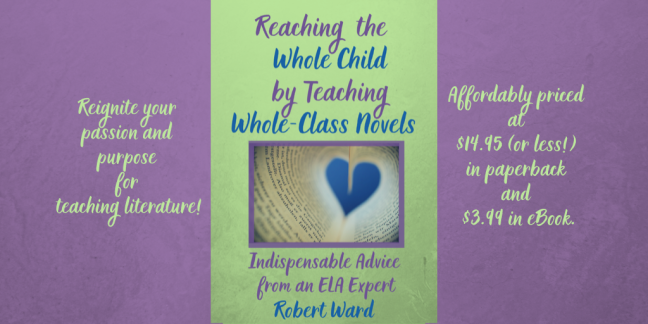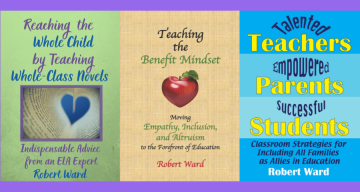Have you ever noticed that the main characters in a great deal of young adult literature are orphans? It has to be more than a coincidence that the inspiring protagonists of some of the most beloved books from the young adult canon are either parentless or are suddenly isolated from the love and support of family and friends.
As I write in my book, Reaching the Whole Child by Teaching Whole-Class Novels, the following is a brief list of literary characters who face extraordinary obstacles virtually on their own:
1. Ponyboy Curtis from The Outsiders
Ponyboy ultimately turns the tragedy of the recent death of his parents and three of his peers into resilience and a will to help others become less judgmental and to appreciate what they have by “staying gold.” Ponyboy also learns how to be sensitive and sympathetic in a bitter, divided world as he finally realizes that courage is remaining calm and peaceful while you find solutions that do not involve hatred, violence, or revenge.
2. Harry Potter from the Harry Potter series
Harry is orphaned and temporarily trapped in a horrible home where he is unwanted and unappreciated.
3. Lonnie Motion from Locomotion and Peace, Locomotion
Orphaned at seven and separated from his sister who is in a different foster home, Lonnie uses the power of poetry and letter writing to deal with loss and to artfully express his yearning for belonging. These books are perfect for teaching how creativity and the written word heal ourselves, as well as inspire others to persevere.
4. Mia Hall from If I Stay
The sole survivor of a family car crash, Mia ponders the meaning of life without her parents and brother. Previously an outsider, Mia has an experience that renders her literally outside of her body, providing a perspective that is as agonizing as it is eye opening. Through this metaphysical metaphor, students join Mia on a journey of heartache that ends in hope.
5. Jeffrey Magee from Maniac Magee
Orphaned (twice) and perpetually running (from himself), Maniac takes a circuitous route in learning to finally face his fears instead of fleeing or giving up. While showing others that friends and family come in all colors and versions, Jeffrey shatters stereotypes and surmounts segregation. Students will understand that the “knots” of life are untied when we embrace challenge, expect struggle, and enlist our resourcefulness to beat the odds.
6. James from James and the Giant Peach
James is an orphan living with his two vile aunts until he embarks on an incredible adventure.
7. The Baudelaire siblings from the Series of Unfortunate Events books
Three oppressed orphans endure alliterative adventures against the evil Olaf.
8. Dorothy Gale from The Wonderful Wizard of Oz series
An orphan girl swept far from home forms friendships, faces witches, and exposes a fraud.

Despite their tumultuous journeys, these characters manage to persevere and to eventually triumph, armed finally with the insight that what they needed most was within them all along. This profound and lasting sense of gratitude provides these young heroes with the strength they need to not only survive but to thrive; and it is this inner fortitude and grace that assures the reader that these characters will be just fine long after The End.
Of course, the crucial lesson the authors of these magnificent books want to convey is universal and elemental: If these children who ostensibly have no one and nothing can summon the self-control, courage, and determination to slay dragons—fearsome beasts that are real and imagined, internal and external—then so can you and I, especially those of us fortunate enough to be in far more comfortable and comforting situations.

In The Outsiders, S.E. Hinton beautifully sums up the meaning of gratitude and of appreciating what you have, even if you currently have very little, with two words: stay gold.
This is my go-to phrase when I am issuing friendly caution to a student who is beginning to stray, as well as when I want to celebrate a student who has been especially sensitive, sympathetic, or supportive. My students know exactly what I mean by these two powerful words because together we have explored and discussed a wealth of amazing novels that we can compare and contrast, as well as learn from and love.
I discovered long ago that merely preaching to my students yields limited results. It is far more fruitful and fun to allow my students to discover for themselves the wisdom of gratitude, grit, and a growth mindset through great stories. These universal themes of thankfulness, perseverance, and self-assurance sustain us through the hard times and spur us to strive for the things that really matter in life, so much of which is meaningful rather than material.

Thankfully, parents and teachers are starting to fully embrace the benefits of social, emotional, soulful, and academic growth. These four fundamental necessities of children must be equally honored because they are inextricably intertwined.
Parents and teachers must attend to the needs of the whole child as they join as allies in education and partners in the nurturing of children. This consistent, cohesive focus on providing all kids with leadership, love, laughter, and learning will ensure that no child feels abandoned or ill equipped to navigate the complexities and challenges that life will present to them.
***

If you liked this article, you’ll love my new book, Reaching the Whole Child by Teaching Whole-Class Novels. It’s my love letter to ELA teachers who want to teach with equal parts practicality and passion!
You are encouraged to share other favorite classic, contemporary, and multicultural characters, both female and male, in the Comments section below. Orphaned, abandoned, or far from home, let’s expand the list of young protagonists who summon the inner strength to carry on and conquer their fears. Also check out Booklist’s 50 Best YA Books of All Time.

A companion to this article is featured on Edutopia as Young Adult Novels that Teach a Growth Mindset where it has been read by well over 210,000 educators and parents and has been shared over 23,000 times! It highlights an ethnically diverse array of eight more literary protagonists. The emphasis of this all-new article is on how these heroes model growth mindset to students. Included are two additional orphaned main characters from Island of the Blue Dolphins and The House of the Scorpion.

For practical strategies for teaching whole-class novels, read Getting Everyone on the Same Page on Edutopia, as well as A Balanced Approach to Teaching Literature: Pairing Whole-Class Novels with Independent Reading Choice.

This article was featured in the U.S. Department of Education’s The Teachers Edition newsletter (August 11, 2016 edition).











LikeLike